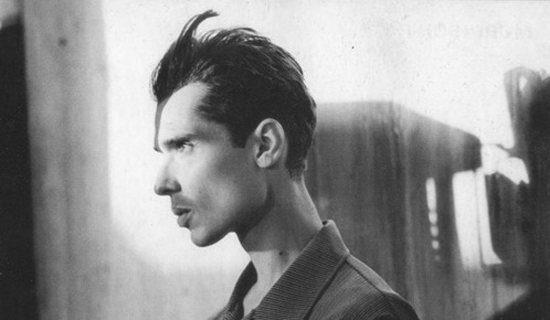Welcome to the final 2012 edition of Hyperspecific, the column that’s hopefully given you a reasonable guide to some of the year’s best electronic music for the club and beyond. (To browse through the rest of this year’s columns and further back, there’s a full archive available here.)
It’s been an intriguing year for fans of dancefloor music especially: where previously it was possible to pick out definite wider trends running through club floors, what’s been most striking about 2012 has been its almost total lack of anything concrete to hang on to. Instead the most exciting music has come from the margins. Certain common tendencies have seen a lot of activity – the crossover region where noise and techno overlap has continued to produce some fascinating music – but individual artists working within those regions tend to be ploughing their own distinct furrow rather than engaging with any larger narrative. Which is great; at the moment these regions (tentatively approached by people discussing ‘outsider dance’, ‘technoise’ and so forth) feel fragile and fertile enough that they’re best allowed to find their own paths. Several of those artists feature in this month’s column: a great new album from Madteo, Container’s cave-rave monster of a second LP, John Heckle’s industrial/electro-pop infused jack tracks.
Keep an eye out, in a couple of weeks’ time for the requisite ‘Hyperspecific’s Tracks of 2012’ list and mix (a reductive and subjective list of some favourites of this year rather than any attempt to be definitive). But that aside, until next year!
Madteo – Noi No
(Sähkö)

In the time period since he’s been intermittently prolific, though this year more ears have pricked up, as his slurred beat collages have fallen loosely into orbit around a growing nucleus of artists doing aggressively experimental things to house and techno. In truth, alongside artists like Morphosis himself and Jamal Moss, Ruzzon’s been at it for longer than most, crafting depth-charged tracks that reference Madlib and J Dilla as much as they do the outre house producers he shares label rosters with. Noi No is just as sublime and strange as Memoria, feeling sonically concerned (as its predecessor’s title hinted) with decay, loss and the unreliability of memory. Intricate details emerge briefly from sludgy ambience before being lost: ‘Bugged In Gaza’s anxious string swoops are pure spaghetti western thanks to Morricone-esque whistles and birdsong, and ‘Rugrats Don’t Techno For An Answer’ stirs Drake’s voice into fragmented, sunken R&B.
What’s particularly fascinating about Noi No is that, in the established literary manner, you’re never 100% sure whether or not to trust your narrator. Several tracks throb along at an apparently comfortable floor-friendly pace, but they’re hissy and tape distorted to the point of dissipating, as though Ruzzon’s only able to recall them in the sketchiest of detail. Even its clubbiest track, ‘Dead Drop (When I Saw You That Nite), is spiked with benzos and barbiturates, and seems barely able to ventilate itself enough to stay alive. Elsewhere his voice is scattered throughout the record offering solipsistic observations in a cracked baritone, in theory adding context to the album’s contents but more often than not muddying the waters still further. "What’s your new year’s resolution?", he asks himself at one point, before the answer comes back, examined in obsessive detail over six minutes: "Stayin’ outta trouble". That single phrase multiplies, layers, glitches and shifts in and out of phase with itself, until his entire psyche is hammering the same idea back and forth, like a scratched record falling into an unexpected locked groove.
So Madteo himself is the character at the album’s heart, and he’s a mercurial presence. While never exactly untrustworthy – the music is often unashamedly open and beautiful, as with the swishing strings and chime chorus of ‘Tanti, Maledetti E Sempre’ – much of Noi No‘s considerable appeal comes from the distinct sense that we’re only ever being given a fraction of the full story. The weight of what’s being held back from view – both sonically, buried in the backround murk, and thematically, encoded within Ruzzon’s obtuse musings – has just as strong an impact as what little can be heard.
Call Super – No Episode EP
(Throne Of Blood)
John Heckle – Voices & Visions EP
(Tabernacle)

Apparently the two remixers were deliberately handed only small fragments of the original tracks, rather than given access to the full stems. That’s audible enough here, given that both John Heckle and Madteo turn in versions that bear only the slightest resemblance (if any) to their parent tracks, but then again both are renowned for approaches that leave very little of their source material intact. As with much of the music on Noi No, Madteo traps ‘No Fun’ in a paranoid thought-loop, setting up an angular groove that repeatedly doubles back on itself to end up back in the same place; by its end you feel refreshed, but unsure whether you’ve actually traveled anywhere in the meantime. Heckle’s track sounds as though it’s being played in real time on an arsenal of vintage drum machines and synthesisers – as is his usual modus operandi – building from a baseline riff/loop into a glorious, colourful, blurred mess of rhythm and melody anchored in Chicago house, 80s industrial (think Chris & Cosey’s techno-romance Exotica), EBM and electro-pop.
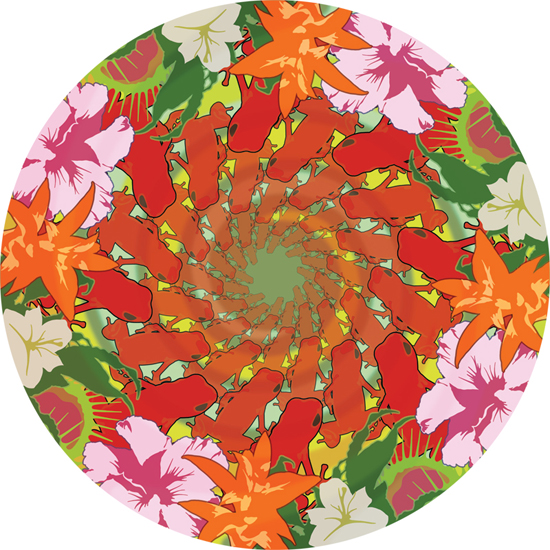
Jar Moff – Commercial Mouth
(PAN)
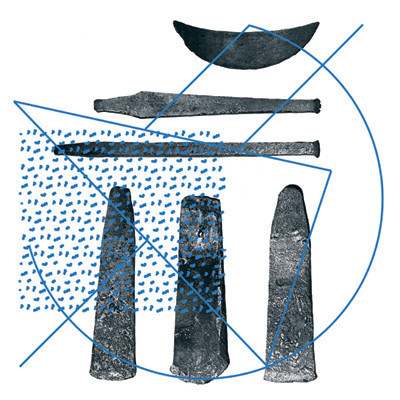
Traces of hip-hop are still present on Commercial Mouth but they’re implied rather than direct, the genre’s loping rhythms assembling themselves from the particulate matter scattered around in a stew of found sounds, static, shortwave radio interference and human voices. At times the results feel borderline psychotic and stretched to the point of unreality: the B-side especially appears drawn from a world where ordinary notions of time and space distort weirdly around the listener. A reference point I can’t help but keep returning to – despite its status as a cliche comparison for dread and dreamstates – is the diner scene in David Lynch’s Mulholland Drive, where a character’s dream gradually integrates itself into reality until a final horrifying shock conclusively melds the two. New and unexpected sounds repeatedly sluice through the mix, often looming suddenly into earshot – one particularly thrilling moment finds a chorus of saxophones screaming upward, taking command for an all-too-short period of time before cracking like a shattered mirror. Later roaring static is melded with tortured human screams, making it difficult to determine which of the two you’re actually hearing – a sonic Rorschach test whose result depends entirely upon your mood at time of listening.
Container – LP
(Spectrum Spools)
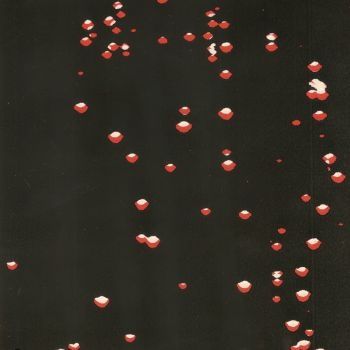
Closer ‘Refract’ is the most devastating example of that approach; I’m not usually one for quoting myself wholesale, but after watching him perform at Unsound in October I described it as "one of the most streamlined and predatory pieces of techno I’ve heard in an age, spiraling towards its victim like a Drexciyan military submarine, its clusters of sonar pings gradually honing closer to their target until they lock on and unleash an almighty barrage of distortion." To be honest I think I’d struggle to better that description. Blisteringly effective though the formula may be, repeated over five tracks there develops a slight sense that it is a formula, in a way that wasn’t so apparent on LP‘s slower-burning predecessor. That’s solved by taking the album’s tracks on their own merit: each individual piece on here is a raw and sinewy exploration of the blurring boundaries between techno and noise, finding an impressively club-friendly middle ground that forsakes little of the latter’s cantankerous nature.
Funkineven – ‘Cha!’/’Dracula’
(Apron)
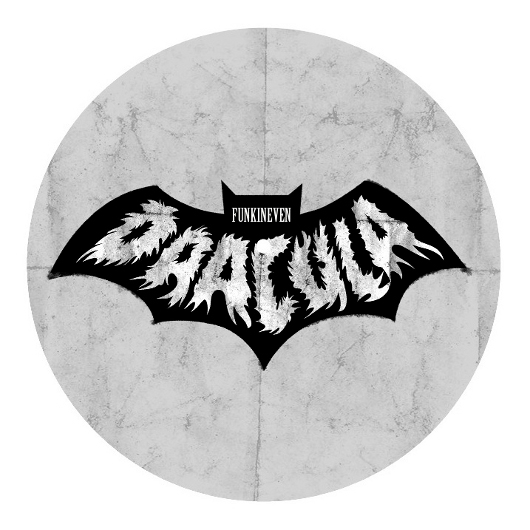
Paired with the grainy acid sweeps of ‘Dracula’, the effect is to make the entire construction feel extremely volatile, as though all the track’s separate elements are conspiring to mash together and pour from the speakers in a toxic chemical flood. ‘Cha!’s drum machine wallop is made to feel almost incidental by the presence of a lumbering bassline that swings its weight back and forth around the beat. After several minutes of punch-drunk swaggering, a series of glistening chords rain downwards through the beat, like clouds parting to allow sunshine to illuminate every darkened corner. They’re gone after only eight bars, never to be glimpsed again.


